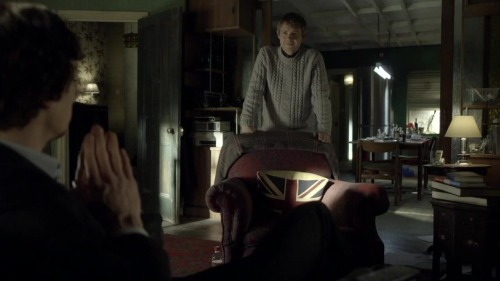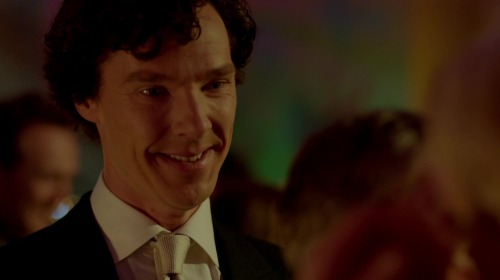S3 characterization: boy, man
Dec. 16th, 2018 10:22 pm
I just rewatched parts of S3 after a very long time. And I started wondering:
If the creators are telling the truth, and they don’t intend a romantic endgame, where did they go astray?
Why did romantic endgame theories explode after S3 in particular?
I’m just theorizing, trying to answer these questions. Also, disclaimer: this is meant to be a friendly meta discussion. that’s all :)
So… let’s back way up to the beginning.
So. If TPTB truly never intended to write a romantic endgame, I’d say their goal for the show is probably the “Sherlock becomes a real boy” character arc: the calculating machine becomes humanized by his friendship with John Watson. This is a lot of what the show’s about, anyway. So let’s imagine this is what they’re actually going for.
This idea makes a lot of sense if you look back to the ACD canon character. ACD Holmes is brilliant, but very detached. He interfaces with society adeptly, but has no friends other than Watson. The idea to explore the human side of this character is incredibly compelling, and it seems like a very likely motivation for TBTB when they conceived the show.
But in modernizing their Sherlock, TBTB pushed the character toward the extreme in some areas: his assholish behavior, his lack of understanding social cues, his self-identification with the term “sociopath.” He makes social missteps in ways that ACD Holmes doesn’t. He is breathtakingly rude where ACD Holmes would more likely be cold yet polite. All of this adds up to a Sherlock who is far more immature and childlike than his canon grandfather. And I think it’s this childlike characterization, especially in S3, that causes the romantic endgame to look like a real outcome.
In S1 and S2, Sherlock’s immaturity is evident, but it’s not in the spotlight. Instead, we’re focused on his mind-over-emotion nature.The flashpoint of S1 is arguably this conversation with John:
JOHN: There are lives at stake, Sherlock – actual human lives… Just – just so I know, do you care about that at all?
SHERLOCK (irritably): Will caring about them help save them?
JOHN: Nope.
SHERLOCK: Then I’ll continue not to make that mistake.
JOHN: And you find that easy, do you?

It’s clear that this is our starting point, and Sherlock is going to change, as a character, from here.
In S2, the Sherlock-becomes-a-real-boy arc unfolds, and he’s tested with emotional situations. Sherlock has to grapple with love (or romance) in ASiB, and fear in Baskerville. We have the vastly resonant “Caring is not an advantage” scene. And then, of course, we have Sherlock’s faked suicide in TRF. All of this points to a character arc where Sherlock Holmes is learning to deal with his heart as well as his brain, and sometimes failing in the process.
(Meanwhile, we have metric tons of chemistry and tension between Sherlock and John, but if you were there at the time, you might recall that the fandom wasn’t reacting en masse as if a romantic relationship was a foregone conclusion.)
Which brings us to S3.
When Sherlock returned from the dead, certain aspects of his character were amplified, specifically his vulnerability and his childishness. It’s likely that this was done to further his character development along the “becomes-a-real-boy” arc – he’s realizing he screwed up, and we’re finally given more of a window into his feelings. But much of this childishness and vulnerability is played for humor, which gives the show a different, less “real” feeling. A lot of this turns up in particular in TSoT.
In TSoT, we see Sherlock grappling with losing John. He misses blatant cues – “it’s Beth” – and sits on the floor folding napkins. He’s shown to have a giant file on John, with a picture of him as the ideal man. The entire episode zooms in on Sherlock’s ultimate conclusion that John is the only person that “keeps him right,” and ends with Sherlock’s heartbreaking exit from John’s wedding, the moment where he realizes he is about to be replaced by a baby.
If you think of Sherlock as a brilliant, capable adult, all of this behavior seems to only have one logical explanation: he is desperately in love with John. How else to explain this? Who else would behave this way, unless they were absolutely in love with the other person?
Well. A child might behave this way.
A lot of Sherlock’s behavior is very much like a kid dealing with the arrival of a new baby sibling. Will I be replaced? Will my favorite person still pay attention to me, and have time to play with me? If you think of Sherlock as a totally immature manchild, all of this behavior could just be… immaturity. Extreme immaturity.
It just doesn’t seem plausible, because some of his behavior is borderline silly, even cartoonish. Yet here in S3, things actually get… a little bit silly. Many of these immature incidents are played as gags: the napkin folding, the ideal man drawing. In a scene that didn’t make the final cut, brilliant perceptive consulting detective Sherlock doesn’t even recognize he’s in a gay bar, when he visits one with John. He even calls himself a child twice – once to Archie, once to John and Mary. Sherlock Holmes, actual child. It’s the same joke throughout the episode, and… it’s not even a great joke, in my opinion.
But if you watch this episode and think, instead, “Sherlock is desperately in love with John,” instead of “Sherlock is basically a child,” the whole thing becomes so much less silly. It’s far more mature. And poignant. And resonant.
It’s so much better.
When you get to that moment when Sherlock deduces the baby – holy shit. If you think he’s in love with John, that’s earth-shattering. Direct hit straight to the heart. Because this moment when Sherlock is beaming, and then his face falls, and then John looks back at him – oh my god.

I think it’s because this “child” characterization is taken to the extreme, that we want to read the episode another way. The childish gag is just not that believable – he’s still Sherlock Holmes. The fact that he misses clues, doesn’t see Mary for who she is (which makes no sense), wants Mycroft’s emotional support at the wedding – really? I find it easier to believe that he is in love. Otherwise his behavior isn’t grounded in reality, and it’s not even particularly grounded in the reality established in S1 and S2.
But if you read this episode, and the season, as an unrequited love story? It’s brilliant. And I would so much rather see the show as brilliant.
After this season and this episode in particular, the fandom began to see Sherlock differently. All the focus on Sherlock as childlike and vulnerable gave rise to a trend of “sad gay baby” and “soft son.” Toplock, which was far more visible in S1-S2 fandom, faded, and Sherlock was overwhelmingly written as a bottom. It doesn’t seem like a coincidence that in a season where Sherlock refers to himself as a baby, that fandom starts to call him things like “baby” and “son.” It came straight from Sherlock himself.
Having been in the fandom for years, and looking back, I feel like S3 was a clear point at which the show began to make much less sense. We had significant plot holes that were not really resolved, and not only that, we had episodes with moments that seemed more cartoonish than real. We needed ways to interpret and make sense of all of it. To me, it seems like looking at S3 (and thus the show) as a guaranteed love story became a way to do that.
(eta: forgot to cite the incredible ariane de vere, whose transcripts I used here.)
383 notes